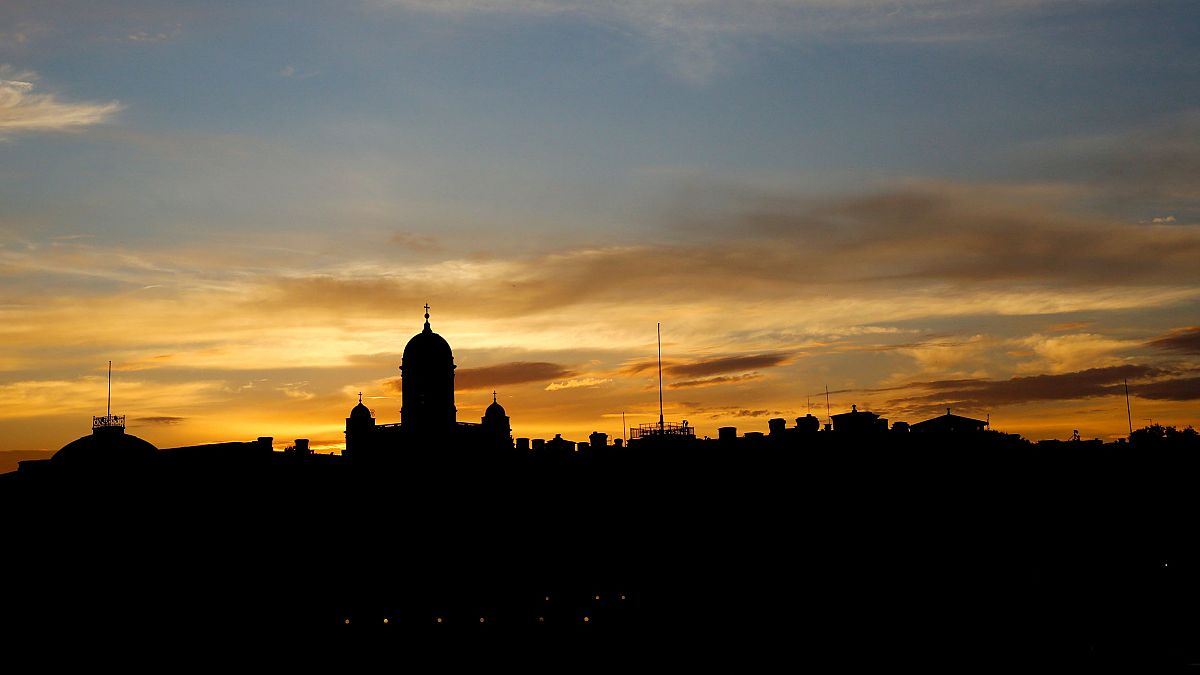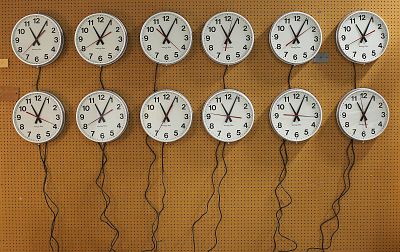In some parts of Finland, daylight saving time barely saves any daylight at all, and many Finns have had enough.
LONDON — What is the point of daylight saving time if the sun doesn't rise or set for most of the year?That's a question that Finland — the most northerly nation in the 28-member European Union — has been asking for a while.Now some Finns are hoping that a Europe-wide public consultation, which closes Aug. 16, will put an end to the biannual hassle of changing the clocks.
It comes after lawmakers in the country, in the easternmost of the bloc's three time zones, concluded in an official report that putting the clocks forward and backmight even be making citizens sick.Jarmo Hietala, 45, a student from Kokkola who attends the University of Lapland in Rovaniemi in the north of the country, despises daylight saving time. So much, in fact, that he refuses to ever change the clocks in his house."I don't need to follow daylight saving time. All my clocks are in normal winter time. And when people say '10 o'clock,' I just add one hour and use mathematics and my brain," he told NBC News."There are some problems in that you have to adjust your computer. I have the South African time zone on my computer — they don't have daylight saving time there, but they have the same [standard] time zone as Finland."The sun doesn't go down on Rovaniemi for most of June and July, and in winter it barely rises. In Lapland, therefore, daylight saving time barely saves any daylight at all.
For Finns such as Hietala, moving the clocks forward an hour in the spring, and back an hour in the fall, is a pointless inconvenience.Yet the country has followed the practice — observed by some 70 nations worldwide, including most of Europe and North America — since 1981.However, 70,000 Finns last year signed a petition asking the government to scrap it.That prompted a Finnish parliamentary committee to consult experts on the topic, leading to the recommendation that the government should do what the petition asked.Changing the clocks, the committee concluded, causes short-term sleeping disorders, impairs performance at work and could lead to serious health problems as citizens struggle to adapt.Finnish researchers, for example, found in 2016 that the rate of the most common kind of stroke increases 8 percent after the clocks are changed."The primary objective should be to abolish the clock movements on uniform basis throughout the European Union," the committee concluded in October.European Union rules require all member countries to follow the same changeover dates — from the last Sunday in March to the last Sunday in October — in order to ensure travel and trade runs smoothly across the bloc.
Finland's move prompted a debate in the European Parliament, where lawmakers called for a "thorough assessment" of the value of daylight saving time.Nils Torvalds, a Finnish member of the European Parliament, said there is a consensus among Finnish lawmakers, and most of his constituents, to abolish it."The message I get on my email, or whenever I'm somewhere in Finland, is that 'could you please have this finished?'" he told NBC News by phone from his office in Brussels.Finns aren't alone in pushing for an end to clock changes, with some support for abolishing the practice in Lithuania, Poland and Sweden too.Seán Kelly, an Irish member of the European Parliament (MEP), has been calling for an end to daylight saving at the E.U. committee level."On a personal level I have found increasingly over the years that the biannual clock change was outdated," he told NBC News. "Then when I became an MEP, I found that there were others with a similar view."He has argued for a switch to permanent summertime, whereas Finland simply wants to see an end to the constant changing.Kelly hopes the European Commission's consultation will provide answers on what arrangement the general public wants. It contains a multiple-choice question asking respondents whether they'd prefer permanent summer time, permanent winter time, or sticking to daylight saving.> "Machines can be programmed, but the inner clock of a human is an another thing."
Despite the popular view that daylight saving time was introduced to help farmers, the practice was first used in the German Empire and Austria-Hungary during World War I as a way to conserve energy and much-needed coal. Its popularity grew again during the energy crises of the 1970s.Modern critics, such as Torvalds, cite studies saying the energy-saving benefits are either negligible or nonexistent."When this was introduced, after it was the first or second energy crisis in the '70s and early '80s, the pitch line was: This is going to save us money," he said. "We haven't seen that money."Indeed, energy consumption habits have changed since the crises of the 1970s, with air conditioning units and personal electronic devices becoming more widespread.When Indiana introduced daylight saving time statewide in 2016, researchers from the University of California, Santa Barbara, found that the move actually increased electricity use by 1 percent, costing the state $9 million.A Massachusetts state commission last year backed a permanent switch from Eastern Time to Atlantic Time, which would end the need for daylight saving changes.
Florida's state Senate, meanwhile, passed a bill in March to keep daylight saving year-round, although it has not yet become law. The state would join Hawaii and most of Arizona in not having a seasonal change.And across the border from Finland, Russia in 2014 changed to permanent winter time after having experimented with switching to permanent summer time in 2011.However, there has been some resistance to change within the European Parliament. Kelly said that European parliamentarians from countries in central Europe have reservations about scrapping daylight saving, or simply don't see the point.Supporters of daylight saving time believe it can improve public safety. Researchers in the U.S. found robberies decreased by 7 percent with the switch to daylight saving in the spring.When the issue was debated in February, Angelo Ciocca, a member of the far-right Italian party Lega Nord and of the European Parliament, brought a giant replica clock into the parliamentary chamber, winding it back an hour to illustrate a "waste of time" and urging legislators to discuss "real issues" instead.But for many Finns, such as the student Hietala, the disruption caused by turning the clock back and forth is a real issue."If people want to get up one hour earlier, of course they are allowed to do so, but to make the whole of Europe do so, it is a bit strange," he said. "Machines can be programmed, but the inner clock of a human is another thing."


